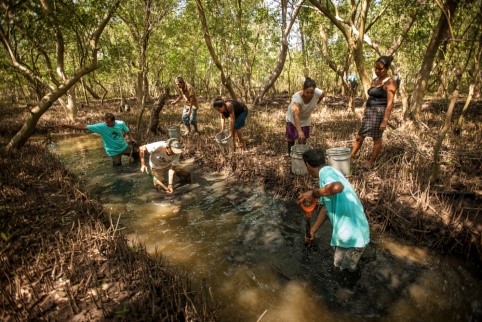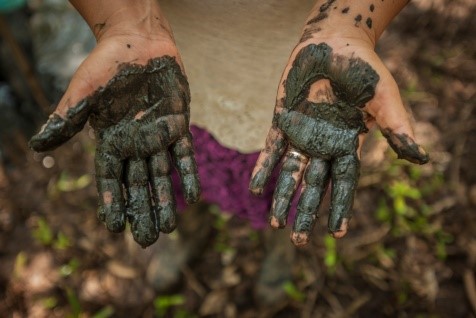Apprentissage par l'action" et suivi pour accroître les capacités et les connaissances
Comité de Microcuenca El Aguacate travaillant à la destruction des canalisations (communauté El Tamarindo)
IUCN @ Paul Aragón
Manos a la obra en los manglares de la comunidad El Tamarindo
IUCN @ Paul Aragón
L'apprentissage par l'action est un processus qui implique la mise en œuvre d'activités d'EbA, associée à un programme pratique de renforcement des capacités pour l'extension des résultats. Outre le renforcement des capacités et des compétences des communautés locales, le processus génère des preuves des avantages de l'EbA grâce à la mise en œuvre d'un système de suivi destiné aux décideurs politiques. Voici quelques éléments et étapes du processus :
- Évaluation participative de la vulnérabilité socio-environnementale des communautés.
- Hiérarchisation des sites de restauration des mangroves, en tant que mesure d'EbA, sur la base de l'évaluation et en complément des connaissances traditionnelles.
- Suivi et évaluation participatifs de l'efficacité des mesures d'atténuation des risques pour la sécurité alimentaire. La recherche (échantillon de 22 familles) vise à comprendre les avantages de la restauration sur leurs moyens de subsistance.
- Processus de renforcement des capacités pour consolider la gestion des ressources naturelles, le plaidoyer local et les capacités d'adaptation, par le biais de formations et d'échanges d'expériences sur l'adaptation :
- Des formations et des échanges d'expériences sur l'adaptation au changement climatique, la gestion des bassins versants et de l'eau, et la gestion durable des mangroves.
- Soutien technique aux communautés, pour entreprendre conjointement la restauration de la forêt de mangrove.
- Activités de suivi conjointes. Grâce à des preuves tangibles, les communautés sont en mesure de sensibiliser l'opinion publique, d'acquérir des capacités de plaidoyer politique et d'accéder à des ressources financières.
- En raison de la faible présence gouvernementale au niveau local, les communautés ont encouragé leur propre auto-organisation par le biais d'associations de développement et d'autres structures locales (par exemple, des comités environnementaux), laissant également la place au leadership et à la mobilisation des femmes, ce qui a pour effet d'accroître le capital social.
- Il est essentiel de travailler à la fois avec les communautés formelles (par exemple, par l'intermédiaire des associations de développement) et avec d'autres groupes locaux de la société civile (par exemple, le comité de microbassin), car ces entités ont un intérêt direct dans le succès des mesures EbA à mettre en œuvre.
- Les parties prenantes locales peuvent faciliter la diffusion des mesures et, partant, leur reproduction, comme cela s'est produit avec les communautés en amont du bassin de la rivière Aguacate, où les parties prenantes se sont intéressées aux mesures mises en œuvre en aval et ont proposé la création d'un forum plus large (une "alliance pour la mangrove") pour l'ensemble de la côte salvadorienne.


